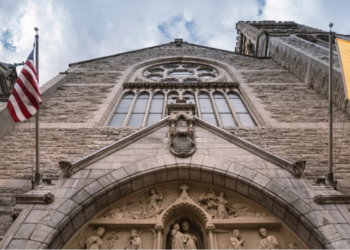If anything has dominated Gen Z’s political experience more than the ascendance of President Donald Trump, it’s been the prominence of LGBTQ issues in every aspect of culture over the past decade.
In the first instance, public opinion came first. President Trump’s victory in 2016 was a popular referendum on Obama-era progressivism that promised hope and change but delivered government overreach and overregulation. That Trump won the Republican nomination in the first place was a repudiation of the party’s neoconservative leanings. And nearly a decade after his entrance onto the political scene, American voters once again sent Trump back to the White House with an electoral mandate.
But where Trump’s dominance in the past decade of American politics was a reflection of public opinion, LGBTQ issues were injected into the nation’s politics. Public opinion swung to the left afterward.
A Decade of Obergefell
Ten years ago this week, the Supreme Court handed down the narrow 5–4 decision legalizing same-sex unions. It’s hard to overstate how consequential it was in shaping public opinion on LGBTQ issues — and in shaping the political consciousness of Gen Z.
Gen Z — which includes individuals born between 1997 and 2012 — doesn’t really remember a world before Obergefell. It’s almost unimaginable that, when its older members were born around the turn of the century, only 35 percent of the country believed that same-sex unions should be recognized as marriages. Even in 2008 and 2009, support for same-sex unions hovered around 40 percent.
In 2015, when Obergefell was decided, 60 percent of Americans told Gallup that they believed same-sex unions should be recognized as marriages. Support only grew in the following years, topping off at 71 percent in 2022 and 2023.
Over the past decade, progressives have aggressively wielded LGBTQ issues as a bludgeon against the Right, conflating opposition with bigotry. Where sexual orientation was previously a private issue, the mid-2010s mainstreamed sexual politics and brought LGBTQ ideology into classrooms, corporate boardrooms, and churches.
A Divided Generation
Unlike past generations, Gen Z was raised with a hyper-focus on sexuality and gender identity. It’s no surprise, then, that such a large portion of Gen Z identifies as LGBTQ.
Polling shows that “almost one in four (23 percent) Gen Z adults … identify as gay, lesbian, bisexual, or something else.” There’s a sizable gender gap in the statistic, though: 31 percent of Gen Z women and 16 percent of Gen Z men identify as LGBTQ. By comparison, the same polling shows 10 percent of overall Americans identifying as LGBTQ.
Despite the higher prevalence of LGBTQ identity among younger Americans, Gen Z support for same-sex unions tracks with broader public opinion, which has diminished slightly since 2023. In fact, support for “LGBTQ rights among 18 to 29-year-olds” has declined in recent years, correlated with drops in support among Republicans. (RELATED: The Youngest Voters Are Trending Conservative)
It’s no surprise that support for the fruits of Obergefell has stalled after “equality” started meaning drag queen story hour, men competing in women’s sports, and double mastectomies for middle-school girls. The Left has overplayed its hand in recent years with its full-throated insistence that transgender ideology, even in its most obviously problematic iterations, should be celebrated by all.
Questioning the Redefinition of Marriage
In line with the polarization between young progressive and conservative voters, members of Gen Z feel either that the nation is not sufficiently liberal or that earlier generations squandered the America they were supposed to inherit.
Writing in First Things, Matthew Schmitz commented on the decline of support for same-sex unions blessed by Obergefell:
The number of those who reject same-sex marriage is increasing today, especially among the young. Perhaps that’s because they have come of age in a society that promotes individual autonomy to such a degree that it undermines all forms of permanence, especially marriage. They probably do not regard Obergefell as having caused the decline of marriage. But they may suspect that the redefinition of marriage is part of a larger project that claims to enlarge their freedom while making their lives less noble and dignity more difficult to obtain.
Exemplified by the “Kamala is for they/them, President Trump is for you” tagline, the most extreme elements of the LGBTQ agenda were rejected at the ballot box in November. While it’s unlikely that the rest of the ideology is going anywhere anytime soon, it’s at least heartening that young Americans are starting to realize that Obergefell’s purported redefinition of marriage was a lie — even if they aren’t old enough to remember a pre-Obergefell nation.
READ MORE from Mary Frances Devlin:




![Man Arrested After Screaming at Senators During Big Beautiful Bill Debate [WATCH]](https://www.right2024.com/wp-content/uploads/2025/06/Man-Arrested-After-Screaming-at-Senators-During-Big-Beautiful-Bill-350x250.jpg)












